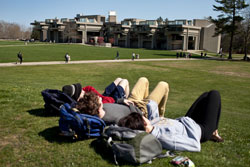When students come to college, they leave a world of 6 am alarms and sleepy rides on dirty busses behind them. Now, they have the power to control when they wake up for class, if they decide to attend that day.
For many students, it isn’t possible to hide from the inevitable 8:30 am class. Students also have the choice to go to classes at the prime 2:30 pm spot, or even take classes that stretch from 7-10 pm once a week. With all these options, plus the sleep deprivation and mounting stress students face, it isn’t easy to pinpoint which time students are more likely to be late, but the majority of students feel that the morning classes are the culprit.
With clubs, sports, work, Greek organizations, community service, textbook readings, group projects, going to the gym, doing laundry, and occasionally eating and sleeping, a college student’s schedule is packed. Each class comes with high stakes of expectations and assignments. For classes that apply to one’s major, skipping or tardiness arent as common.
Students understand that these classes are instrumental to their lives post-college. But for that Intro to Geology course on Friday morning… skipping doesn’t seem like a big deal. Sometimes, I will give myself a pep talk into skipping a class like this. I’ll tell myself, “Hey, you deserve this. Go back to sleep.” But then, when I roll into Edison the next week and realize I didn’t learn about the bone structure of dinosaurs, I’ll regret those two extra hours of slumber. Skipping class offers students a way to control their daily lives more so than in high school, and the precipice of whether to skip or not, to show up half an hour late or not, is steep.
One of the reasons students skip or come late is because the consequences aren’t as dire as in high school. The Vice Principal isn’t going to call your mom at work or leave a message on the home phone. No one has to know you stayed in to catch up on “Grey’s Anatomy!” The consequences, of course, come down the line, when you aren’t prepared for the pop quiz during the next class.
When students are bogged down with all the work and activities college throws at you, waking up in the morning isn’t easy. There are no mothers knocking on your bedroom door to wake you up, and it sure isn’t your roommate’s job to be your alarm clock. So you sleep in. You give yourself a half hour to nap it out, and roll into class in your sweats. When polled on what time they were more likely to be late to class, the answer of “morning” was overwhelming. Not one student claimed afternoon or evening.
Jackie Giacalone, a sophomore public relations major, explained, “In the morning I’m more likely to oversleep, but at night I’m up and ready to go.”
Danielle Romanowski, a sophomore in the PR field, agreed. “[I’m most likely to be late in the] morning, because I never want to get out of my bed,” she said.
While rolling into class late doesn’t seem like a big deal, it can lead to a bad habit. If a student skips once, they are more likely to make skipping or tardiness a habit. College is supposed to prepare students for the workforce, and if you don’t feel like coming in to the office at 9 am, you can’t just cruise in at 11 am and expect no consequences.
It also is frustrating for professors, who fill up their allotted class time with as much as they can. A student coming in halfway through disrupts the flow of the class, and shows the professor that the student doesn’t really care. Jennifer Mantle, an instructor of the English department, points out that a big reason students come late or not at all, is poor time management.
“It disrupts the class,” she said of when students come late. If students could achieve better time management skills, perhaps that could help with students coming late. After all, “They know from the syllabus it could affect their grade,” Mantle adds. From a professor’s point of view, Mantle prefers that students come late, rather than not at all, but not if they are going to miss half of the class.
“What bothers me is the disrespect for their classmates,” she concluded, referring to the fact that if a student bursts in in the middle of a lecture; it can throw off the focus of the students.
While hitting the snooze button a few times in the morning seems like a fine idea, it’s vital for students that they don’t let it become a habit. If they skip and ask a peer what they missed, they will usually get the reply “Nothing much.” The student will assume this is true, and then once the test comes around, they’ll realize they missed out on a lot of information. College students have freedom and the power to choose, and what we need to do more, is choose to come to class.
IMAGE TAKEN from nbcnews.com



